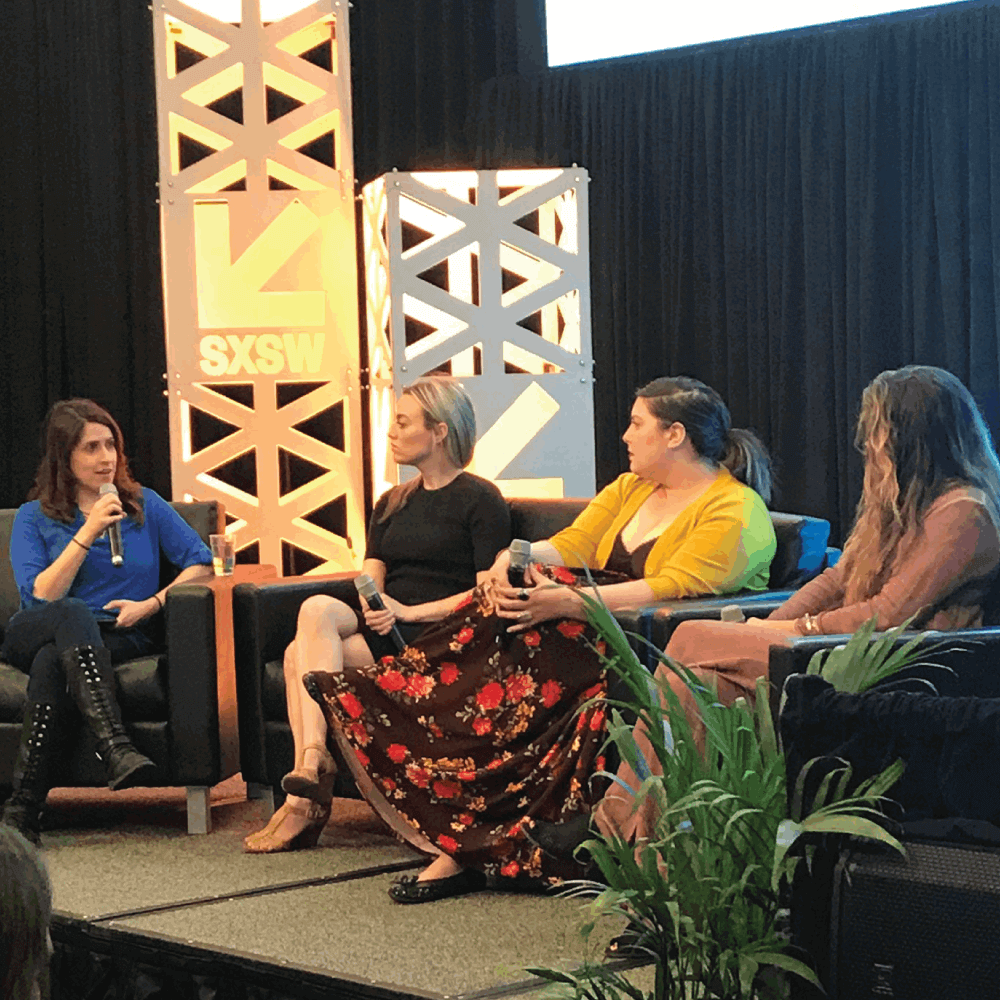Time’s Up has been a widespread phenomenon to push gender equality and fight harassment. The movement came to a head in the music industry when the president of the Recording Academy, Neil Portnow, told reporters that women need to “step up” in order to claim an influential position in the industry. His remark quickly sparked outrage from multiple female artists including three of Vydia’s own creators who took to the SXSW Discovery Stage to share their experiences and offer advice about turning the #TimesUp hashtag into action.
Meet the Time’s Up Panelists
VP of Product Management and Marketing at Vydia, Jenna Gaudio, hit the SXSW 2018 Discovery Stage to moderate a panel of three influential Vydia creators, Mary Lambert, Emma White, and Emily Hackett, about how to overcome the gender imbalance in the music industry along with the Time’s Up movement. The first panelist, Mary Lambert, is a singer-songwriter and Grammy nominee best known for her transcendent chorus in Macklemore and Ryan Lewis’ hit “Same Love”. The next featured panelist was named one of Rolling Stone’s “10 New Country Artists You Need to Know” and Buzzfeed’s “2018 Country Music Obsessions”, Emma White. Our final panelist, Emily Hackett, has opened for some of the hottest Country acts including Lady Antebellum, Jason Aldean, Luke Bryan, and Rascal Flatts.

Their Take on the Time’s Up Movement
The panel started with each creator sharing their thoughts on the movement and soon led into the discussion of the trials and tribulations that come with being a female in the music industry. When referencing Neil Portnow’s “step up” comment, Lambert exclaimed, “I laughed so hard when I heard that. I was like, that’s so funny that that’s what you’re saying to people! Don’t tell people that, that’s not real!” To further refute his comment, White also shared her own experiences trying to securing a publishing deal and getting denied, “I’ve been told so many times that we can’t sign you…I literally had someone tell me, you know how to write a song, but we can’t sign you because you’re a woman, and we can’t sign another female.”
The women agreed that the movement has inspired them to share their voice and not be afraid to speak up– whether it be through music, art, or some other form. Lambert, who is currently producing her next album, revealed that she even found herself conflicted, creating music to fit the male frame of mind, “As I’m producing and listening to stuff I’m like, ‘Oh it doesn’t slam, it doesn’t do the thing,’ but then I’m like, ‘Does it need to do the thing? Or is that part of the insidious male gaze that I’m now internalizing to create my music so it sounds good to men?’ I feel conflicted about it because at the same time, I want to play. I want a seat at the table. So does that mean that I have to start producing in a more aggressive way to get heard? Does that mean that I need to start being the ‘cool guy?”. While there may be limited “seats at the table” for women in the music industry, Emily Hackett made the valid point:

To keep the movement going forward, the women agreed that female artists should offer support and share in each other’s success.
What’s Next for Time’s Up?
To close out the panel, Gaudio posed the thought-provoking question, “Do you think this movement can go past and transcend just sexual harassment? There’s such low gender diversity in music as well, such little representation of female artists. Do you think this Time’s Up movement will give us enough of a light that women can transcend that limit?” Lambert, White, and Hackett all concurred that Time’s Up has already taken a broader meaning, however, to truly ignite change, women in the industry need to hold everyone, including themselves, accountable and speak up. “Keep talking. Don’t be afraid to speak up, ever. I have been silent about so many things, and I have to remind myself daily to just speak up, to not be afraid of being ostracized, and know that other people who want to do the right thing will support you.”
To learn more about Vydia’s SXSW panels, head over to our blogs.
